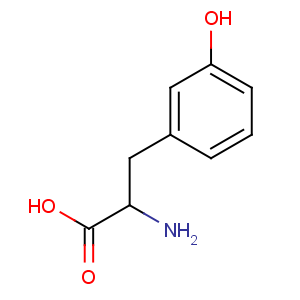Title: m-Tyrosine
CAS Registry Number: 587-33-7
CAS Name: 3-Hydroxy-L-phenylalanine
Synonyms: a-amino-3-hydroxyhydrocinnamic acid; metatyrosine
Molecular Formula: C9H11NO3
Molecular Weight: 181.19
Percent Composition: C 59.66%, H 6.12%, N 7.73%, O 26.49%
Literature References: A possible precursor of catecholamines: Sourkes
et al., Nature 189, 577 (1961). An intermediate in an alternate pathway for the biosynthesis of catecholamines, where with the existing hydroxylating enzymes
m-hydroxylation of phenylalanine to
m-tyrosine occurs before
p-hydroxylation (forming dopa) and is followed by subsequent decarboxylation to dopamine. Formation
in vitro of dopa from L
-m-tyrosine: Tong
et al., Biochem. Biophys. Res. Commun. 43, 819 (1971);
in vivo: Hollunger, Persson,
Acta Pharmacol. Toxicol. 34, 391 (1974). Biosynthesis and metabolism studies: D'Iorio
et al., Adv. Neurol. 5, 265 (1974). Has also been isolated from a plant source,
Euphorbia myrsinites L.
Euphorbiaceae: Mothes
et al., Z. Naturforsch. 19b, 1161 (1964).
m-Tyrosine has the ability to cross the blood-brain barrier and is decarboxylated to
m-tyramine which stimulates dopamine receptors, presumably accounting for the demonstrated pharmacological effects of
m-tyrosine. Pharmacological studies: Carlsson, Lindqvist,
Eur. J. Pharmacol. 2, 187 (1967); Rubenson,
J. Pharm. Pharmacol. 23, 228, 412 (1971); Sandler
et al., Nature 229, 414 (1971); Ungerstedt
et al., Eur. J. Pharmacol. 21, 230 (1973). Crystal and molecular structure: Byrkjedal
et al., Acta Chem. Scand. 28B, 750 (1974).
Properties: mp 267-270° (dec). [a]D22 -14.5° (70% ethanol); [a]D22 +8.9° (70% ethanol, 2
N HCl).
Melting point: mp 267-270° (dec)
Optical Rotation: [a]D22 -14.5° (70% ethanol); [a]D22 +8.9° (70% ethanol, 2
N HCl)

